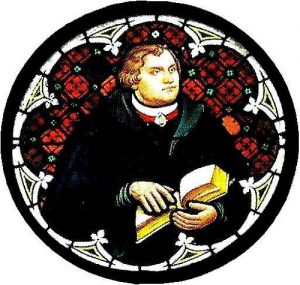Lectionary Reflection for Sunday, October 25, 2015
For there is no distinction, since all have sinned and fall short of the glory of God; they are now justified by his grace as a gift, through the redemption that is in Christ Jesus… Romans 3:22b-24
The denomination of which I am a part, the Evangelical Lutheran Church in America, has as its 25th anniversary campaign slogan “Always Being Made New.” The longer I am exposed to this slogan, the more I like it because it reminds me that as a Lutheran Christian I am called to re-formation on a continual basis. Even though I do die daily to sin, I also rise to newness of life; therefore, I am indeed always being made new. Thanks to the amazing gift of grace in Christ Jesus, I have options! I have a future, and I have the potential to be about the work of announcing the radically alternative reign of God right here and right now.
 For Lutherans, this coming Sunday is usually celebrated as Reformation Sunday. It’s the day when Lutherans show up to worship wearing as much red as possible, sing “A Mighty Fortress” with reasonable gusto, and are reminded how Martin Luther’s understanding of and teaching about justification by grace alone through faith alone sparked reform and renewal. Lutherans aren’t the only Christians who recall the Reformation on this Sunday, but certainly not everyone does.
For Lutherans, this coming Sunday is usually celebrated as Reformation Sunday. It’s the day when Lutherans show up to worship wearing as much red as possible, sing “A Mighty Fortress” with reasonable gusto, and are reminded how Martin Luther’s understanding of and teaching about justification by grace alone through faith alone sparked reform and renewal. Lutherans aren’t the only Christians who recall the Reformation on this Sunday, but certainly not everyone does.
Regardless of whether you will be looking at an altar draped in red paraments, green paraments, or no paraments at all, we can probably agree that the church has changed a lot over the last 500 years, and it appears to be on the cusp of another great change. What will it look like when it shakes out? Who’s to say? What we can safely assume is that there are plenty of options to how God’s timeless and eternal story will be communicated and experienced, and that what we’ve known in the last century is probably not going to be what the church will look like in another hundred years.
Having options and being asked to make choices can be both liberating and terrifying. There is comfort in tradition and routine, and we tend to resist change in the church, closing our eyes to any manifestation of it. But we are called to be reforming people, whether or not we are Lutheran. The Good News of Jesus Christ is timeless and unchanging, but it aims to be presented in fresh, new ways that speak to every age and context. And we can take a cue from Luther and the other 16th century reformers and make good use of the tools available to us, especially this Sunday when we have some very good choices for lessons and celebrations.
 This Sunday is also designated as Social Media Sunday (#SMS15), a happy coincidence, as the purpose of Social Media Sunday is to encourage social media use as a ministry tool in congregations that are not yet using social networking platforms, to boost its use in congregations that are already engaged, and to demonstrate the power of social media to be and do church in many different ways. The day was started in 2013 by Carolyn Clement at Trinity Episcopal Church in Tariffville, CT. In three short years it has become an international ecumenical event where congregants are encouraged to tweet out sermon quotes, take selfies in their congregations, and share God’s love using various social media platforms. For more information, click here. No matter what lesson or lessons you choose as your focus for preaching and teaching, and whether you plan to celebrate Reformation Sunday and/or Social Media Sunday or another Sunday in the long green season that is the Time After Pentecost, you have plenty of excellent opportunities and options to tell the story of Jesus’ love for humankind in all of our bumbling, blinded, and stubborn ways.
This Sunday is also designated as Social Media Sunday (#SMS15), a happy coincidence, as the purpose of Social Media Sunday is to encourage social media use as a ministry tool in congregations that are not yet using social networking platforms, to boost its use in congregations that are already engaged, and to demonstrate the power of social media to be and do church in many different ways. The day was started in 2013 by Carolyn Clement at Trinity Episcopal Church in Tariffville, CT. In three short years it has become an international ecumenical event where congregants are encouraged to tweet out sermon quotes, take selfies in their congregations, and share God’s love using various social media platforms. For more information, click here. No matter what lesson or lessons you choose as your focus for preaching and teaching, and whether you plan to celebrate Reformation Sunday and/or Social Media Sunday or another Sunday in the long green season that is the Time After Pentecost, you have plenty of excellent opportunities and options to tell the story of Jesus’ love for humankind in all of our bumbling, blinded, and stubborn ways.
Mark 10:46-52 (22nd Sunday after Pentecost, Year B)
It’s all about faith. Blind Bartimaeus will not be denied his request for mercy when Rabbi Jesus is passing by. His plea is so incessant and compelling that Jesus stands still, has him brought over, and asks him “What do you want me to do for you?” His request? To be able to see again. Jesus replies “Go; your faith has made you well.” His sight is restored and he follows Jesus on the way. We, too, can be blind, but Jesus does not leave us bereft. We can “take heart” and come to Jesus, whereby faith our sight can be restored. With our eyes opened to see our Lord, we can then follow him as faithful disciples. We are made new, made whole, and made well by faith. For a wonderful treatment of this lesson as a Reformation Sunday choice, see Pr. Rob Myallis’ fine reflection on the lesson here.
John 8:31-36
This is the appointed lesson for Reformation Sunday, and while it offers an opportunity to talk about being enslaved and being free, one should be careful in the treatment of the lesson to avoid any hint of anti-Semitism. Lifting up the idea of continuing in Jesus’ word as integral to discipleship, an exploration of what enslaves us today vs. the freedom offered in Christ, or some unpacking of “the truth” that makes us free are all rich possibilities for this lesson in the light of being re-formed as people of God.
Jeremiah 31:31-34
What does it mean to truly “know the Lord” rather than study, teach each other, or simply speak the need to know God? How are we re-formed as God’s beloved people in light of centuries of failing to live up to God’s intent for us? This lesson complements well verse 36 of John’s gospel “So if the Son makes you free, you will be free indeed.” In Christ we come to know God, our sins are forgiven, and we stand justified by grace through faith.
Romans 3:19-28
This lesson is captures the essence of the Reformation in nine verses. The law convicts us, drives us to the foot of the cross where by faith we are made whole. It is not something we can accomplish for ourselves, but rather only as a free yet costly gift.
Jeremiah 31:7-9 (22nd Sunday after Pentecost, Year B)
We are gathered, the whole rag-tag lot of us from the far corners of the earth, brought weeping home to be consoled and given voices with which to sing praises to God. These three short verses contain a double measure of hope that is as helpful in 21st century contexts as it was to the remnant of the nation of Israel. Again, we are always being made new, and there is always, always hope in the way of the Lord.
In Worship
Make today a joyful day no matter what lessons you choose. Both Psalm 126 and 46 are hopeful, joyous, and comforting songs. Consider incorporating some aspect of Social Media Sunday in your worship. Include a litany, a blessing of devices, and an opportunity to “tweet, text, or message” the good news from your place of worship. Click here for more ideas.
With Children
Old and New Invite the children to play a game of “Old and New.” Find a few items (or photos) that you can contrast new versions with old items. Maybe you contrast a very old flip phone and a new iPhone or an old Apple computer and a new iPad. You might show a photo of an old phonograph and a new iPod. You might invite children to think about how people traveled to church when your church was founded (presuming it’s an older congregation)–on foot, horse and buggy, car. Next talk about the Bible and how the stories of faith have been passed on: from an oral tradition, to scrolls, to the printing press, to Bible apps. The stories are old–timeless–but the delivery method has changed with time. We use the tools we have available to us to share the good news, whether that be using social media or our voices or the printed word. God is always doing something new among us, and that is VERY good news.
Photos: Daniel Oines and Carolyn Clement. Creative Commons




Leave a Reply